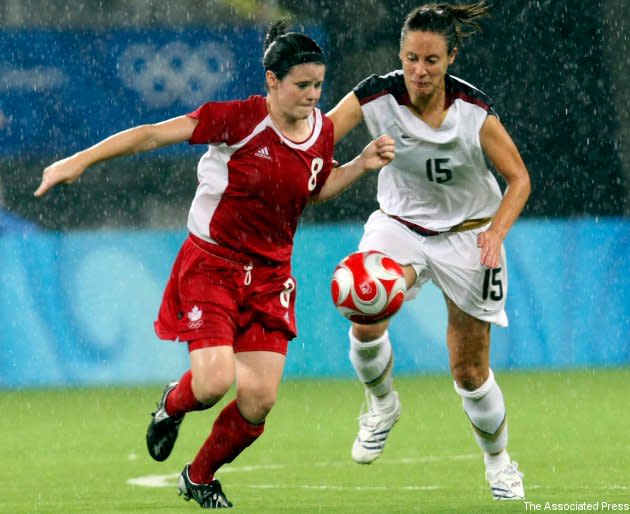Diana Matheson on Olympics preparation, ‘Because I Am A Girl’ and women’s pro soccer
After finishing second at January's Olympic qualification tournament, midfielder Diana Matheson and the rest of the Canadian women's soccer team are gearing up for the London Games this summer. Their most recent test was a friendly against China in Moncton last week, which Canada won 1-0 in stoppage time when Matheson set up Christine Sinclair for a late finish. The team's back in Vancouver now and training hard, but they've also taken the time to promote important causes, including a stop in Toronto with the Because I Am A Girl initiative last Friday to train with a local girls' team, raise awareness of girls' rights' issues around the world and raise money for a girls' soccer program in Colombia. On Wednesday, Matheson took time to talk about Canada's Olympic preparations, why the team's gotten involved in the Because I Am A Girl movement and the state of women's soccer around the world.
Matheson said the China match wasn't a perfect showing for the Canadians, but there were promising signs, and the late goal allowed them to come away from it with a positive feeling.
"We were definitely happy to get the result," she said.
Matheson said the team's focus lately has been on improving their defensive cohesion, so holding China scoreless and limiting their chances was a positive step. Now, they have to look at the other end of the pitch.
"Definitely, going forward we want to score more," she said.
Sinclair stepped up on that front last week, though, as she so often has done over the years. That tally was her 134th international goal, the third-highest total of all time (behind only Mia Hamm's 158 and Abby Wambach's 135). Matheson's played on the senior national team with Sinclair for almost a decade, and said Sinclair's brilliance comes from her ability to set others up as well as finish.
"She's unbelievable," Matheson said. "She's a great goal-scorer, but she's a great playmaker as well."
While most days leading up to the Olympics have seen the team training hard (they're based in Vancouver and generally do one or two intense practice sessions per day, plus rehab, video work and other off-field activities), they've also taken the time to get out in the Canadian community with events like Friday's Because I'm A Girl training stop. Matheson said the program, which focuses on improving conditions for girls worldwide, was a natural fit for the team to support.
"The topic of girls' rights is close to us, and it's about supporting girls' rights internationally," she said.
The Canadian team is particularly involved in supporting a project to provide girls with equal access to sport programs in Colombia, and sales of the pink headbands and shoelaces they were wearing ($11.99, available here) will go to that cause. Matheson said that's a particularly good project for the team to be involved with.
"The component in Colombia is sport-related, so that made it a perfect fit," she said. "It's a great cause and we're thrilled to be involved."
Matheson has an interesting perspective on girls' access to sporting programs, as she starred at Princeton University in the NCAA. Women's sports used to be tremendously underfunded in the U.S., but much of that changed following the introduction of Title IX legislation, which forced educational institutions receiving government funding to provide women equal access to educational and sporting programs and dramatically changed the sports landscape in the process. That legislation's celebrating its 40th anniversary this year, and Matheson said it played a crucial role in providing opportunities for Canadian female athletes like herself as well as Americans.
"It's a huge deal for women's sports; it set a precedent," she said. "Canada has definitely benefited from that as well."
While Title IX has drastically improved women's sports at the college level, many women's professional leagues still struggle. A case in point is Women's Professional Soccer, which suspended operations for 2012 following a messy ownership fight. Matheson said she loves the idea of a North American fully-professional league (mixed pro and semi-pro circuits like the W-League are around, but they're quite different from the WPS model), so it's disappointing to see WPS struggle (even if its issues have benefited the Canadian team in some ways).
"Having a U.S. league again would be fantastic," she said. "It's unfortunate it hasn't worked out so far."
Matheson said she thinks there's enough fan interest to support women's soccer, so the key to making a pro women's league work for the long term would be finding ownership stability and starting with low salaries to keep costs down.
"The amount they paid the women was way too much compared to what they do in Europe," she said. "It's just a matter of getting the right people in to run the league."
For the moment, though, she and the rest of the Canadian team are squarely focused on London. Matheson said the Canadian team's pumped up for the Olympics, and their expectations are to do better than the quarterfinal loss they suffered to the U.S. in Beijing.
"Last time, there was a bit of a 'happy to be there' attitude," Matheson said. "This time around, we're going in to get a result."

 Yahoo Sports
Yahoo Sports 



